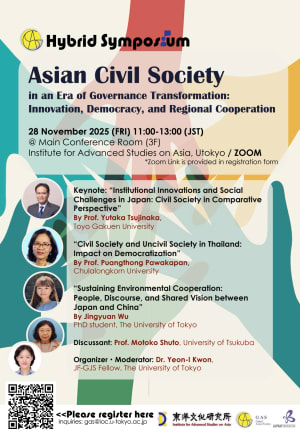We cordially invite you to GAS Symposium on November 28 (Fri), 2025. This event is held in a hybrid format. Please register using the form below.
Date and time: November 28 (Fri), 2025, 11:00-13:00 (JST)
Venue: Main Conference Room (3F), Institute for Advanced Studies on Asia, UTokyo; Online (Zoom)
Title: Asian Civil Society in an Era of Governance Transformation: Innovation, Democracy, and Regional Cooperation
Registration: https://forms.gle/rda4jDgDUbRnm83W9
Language: English
Program:
| 11:00-11:05 | Opening Remarks Dr. Yeon-I Kwon, JF-GJS Fellow at Institute for Advanced Studies on Asia, The University of Tokyo |
| 11:05-11:45 | Keynote Presentation "Institutional Innovations and Social Challenges in Japan: Civil Society in Comparative Perspective" Prof. Yutaka Tsujinaka, Toyo Gakuen University |
| 11:45 -12:00 | Resource Presentation 1 "Civil Society and Uncivil Society in Thailand: Impact on Democratization" Prof. Puangthong Pawakapan, Department of International Relations, Faculty of Political Science, Chulalongkorn University, Thailand |
| 12:00 -12:15 | Resource Presentation 2 "Sustaining Environmental Cooperation: People, Discourse, and Shared Vision between Japan and China" Jingyuan Wu, PhD student at Department of International Studies, Graduate School of Frontier Sciences, The University of Tokyo |
| 12:15 – 12:30 | Discussant Commentary Prof. Motoko Shuto, Professor Emerita at University of Tsukuba |
| 12:30 -12:45 | Open Discussion |
Outline:
Asia is entering an era of governance transformation, driven by demographic change, institutional reform, and shifting regional dynamics. Civil society has become an increasingly important actor in this process, yet its effectiveness and legitimacy remain contested.
The keynote presentation focuses on Japan, analyzing institutional innovations designed to address challenges such as declining birthrates and digital transformation. Drawing on the Japan Interest Group Study (JIGS), a long-term comparative survey of civil society in 15 countries, the keynote highlights Japan’s past success in mobilizing civil society and its current struggles to adapt to emerging issues.
In addition to the keynote, two research presentations broaden the discussion. The first examines Thailand’s divided civil society, where weak pro-democracy movements coexist with powerful “uncivil society” groups aligned with royalist and ultranationalist narratives, often reinforced by military involvement. The second explores Japan–China environmental cooperation, tracing its evolution from ODA-based aid to post-ODA collaboration, identifying networks, discourses, and shared visions as sustaining elements, while also noting challenges in advancing more-than-state relationships.
Taken together, the symposium offers a comparative framework to assess how civil society contributes to or constrains governance in Asia’s era of transformation, highlighting both its potential and its limitations in shaping democratic development, institutional innovation, and regional cooperation.
□ Keynote Presenter’s Bio:
Professor Yutaka Tsujinaka is President of Toyo Gakuen University in Tokyo. He previously served as Vice President at the University of Tsukuba and Tokai University, and as President of the Japanese Political Science Association (2014–2016). He holds a Doctor of Laws (Political Science) from Kyoto University and a master’s degree from Osaka University. Professor Tsujinaka is a leading scholar in the study of civil society, interest groups, and governance. He directs the Japan Interest Group Study (JIGS), a large-scale cross-national project on civil society in 15 countries, which has compiled data on more than 63,000 associations since 1997. He has authored numerous works on civil society and interest groups in Japan, South Korea, China, and other countries. His major works on these topics have been translated into Korean, Chinese, and English. Representative English publications include Comparing Policy Networks (Cambridge University Press, 1996), Neighborhood Associations and Local Governance in Japan (Routledge, 2014), and Aftermath: Fukushima and the 3.11 Earthquake (Transpacific Press, 2017).
Organizer: Dr. Yeon-I Kwon (JF-GJS Fellow) and GAS Initiative
Contact: gas@ioc.u-tokyo.ac.jp

